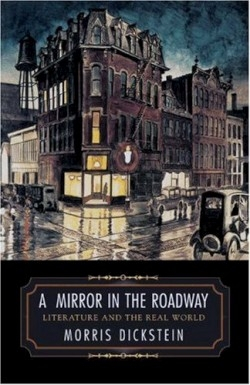A Mirror in the Roadway
Literature and the Real World
“Novels mediate between subject and object, the perceiver and the things perceived, the hard facts of the world and the contingencies of the language we use to describe them,” writes the author in his introduction to this trenchant collection of occasional essays, reminding readers of the insight and complexity of traditional literary criticism. Dickstein grazes amply in the meadow of twentieth-century innovation, stopping along the way to explore a wide range of novelistic luminaries, including Upton Sinclair, Willa Cather, Sinclair Lewis, Franz Kafka, George Orwell, Philip Roth, Bernard Malamud, Günther Grass, and Gabriel García Márquez.
The book takes its title from a phrase in Stendhal’s The Red and the Black, in which a novel is likened to a mirror that reflects the “road” of life. For the most part, Dickstein assumes that this fictionalization of the real world is a valuable exercise, even one with intrinsic moral value. Such a perspective is, of course, entirely in keeping with his work; among his many publications are Gates of Eden: American Culture in the Sixties, Leopards in the Temple: The Transformation of American Fiction, and Double Agent: The Critic and Society. He is also a frequent contributor to The Nation, and his essays have appeared in other journals and anthologies.
Dickstein draws connections between Romanticism and developments in fiction as he discusses the influence that Keats and Whitman had on early twentieth-century novelists such as F. Scott Fitzgerald. Equally fascinating is the essay, “Silence, Exile, Cunning,” which details the immigrant experience and its effect on American fiction. In fact, Dickstein’s wealth of literary references can easily blind readers to the writers who are left out of the canon he constructs. It takes real effort to notice, for example, that “The Complex Fate of the Jewish American Writer” includes Philip Roth, but omits his feminist counterpart, Erica Jong, or that only three essays in seventeen include female names in their titles. African American writers are barely mentioned, and the reader’s first reaction may be to dismiss Dickstein on these grounds.
Perhaps it is time, however, for the “white, male canon” to take its place as merely one among many. Read Dickstein for what he contributes, and look to other experts for what he does not. His relevance and breadth remain undeniable and may even add to how one thinks about other significant writers and their work: “Whether our great writers sought exile to free up their imagination or simply had it thrust upon them, the results were the same: a new language to convey the bruising effect of modern life as the rest of us have dumbly experienced it. At those higher frequencies, they still speak for us.”
Disclosure: This article is not an endorsement, but a review. The publisher of this book provided free copies of the book to have their book reviewed by a professional reviewer. No fee was paid by the publisher for this review. Foreword Reviews only recommends books that we love. Foreword Magazine, Inc. is disclosing this in accordance with the Federal Trade Commission’s 16 CFR, Part 255.

